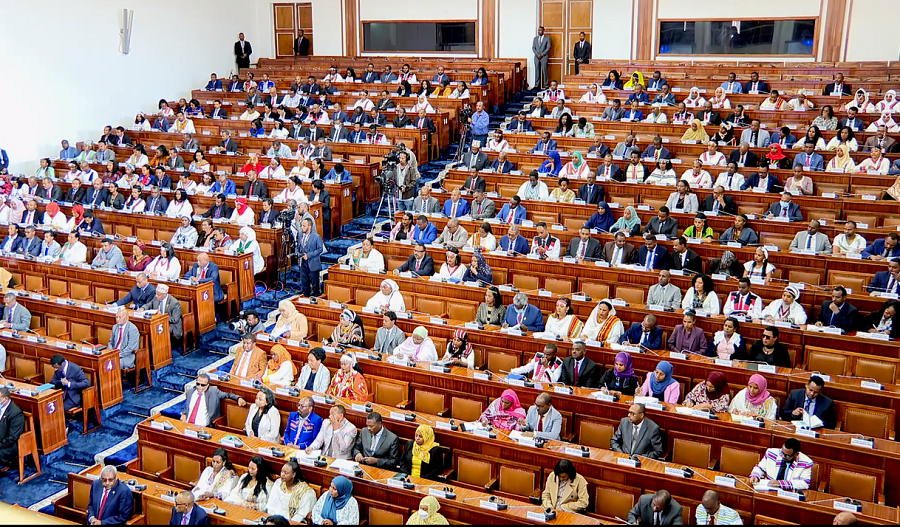Five leading Ethiopian insurance companies, Abay Insurance, Africa Insurance, Ethiopian Insurance Corporation, Nyala Insurance and Oromia Insurance have launched the Agricultural Insurance Consortium of Ethiopia in partnership with Pula Advisors, targeting 3 million farmers in 2026 only. The new platform brings together government institutions, insurers and technology partners in a coordinated effort to protect 12 million smallholder farmers from climate-related risks.
The launch received strong endorsement from key government stakeholders, including Semereta Sewasew, State Minister of Finance for Economic Cooperation, and Belay Tulu, Director of the Insurance Supervision Directorate at the National Bank of Ethiopia, alongside other officials, development partners, and farmer representatives. A major announcement during the event was the commitment to expand index-based insurance coverage to three million farmers by 2026 through joint efforts.
Belay said that the government is frustrated with funding and overseeing “short-lived projects” and stressed that financial inclusion remains a core responsibility of the government.
Despite significant government investments and efforts to expand agricultural insurance through extension services and targeted programs, the sector continues to face three critical challenges: affordability and product design, limited farmer awareness, and underutilization of technology. The Agricultural Insurance Consortium of Ethiopia was launched in light of these major issues. Over recent years, Pula Advisors, in close collaboration with the Agricultural Transformation Institute, regional agriculture bureaus, and key development partners such as World Food Program (WFP) and KfW, has made significant progress in building a more resilient system. Together, they developed effective insurance products, improved distribution channels, and reached nearly one million farmers across multiple regions.
Building on this momentum, the Ministry of Agriculture, supported by UNDP and JICA, established a Rural Financial Services Unit to scale these initiatives nationwide. The newly launched Consortium directly addresses these barriers by uniting insurers, government institutions, and technology partners to develop affordable insurance models, enhance farmer education, and leverage cutting-edge digital tools.
The Consortium has improved affordability by introducing a bundled insurance model linked to the government’s Input Voucher System, significantly lowering premiums through risk pooling and covering over 10 million farmers across more than 200 woredas at a low cost of ETB 200. To raise awareness, it is investing in extensive farmer engagement through training, nationwide roadshows, SMS, IVR messaging, and collaboration with government extension agents to integrate insurance education into existing advisory services.
On the technology front, the Consortium uses Pula Advisors’ advanced digital tools, Mavuno for real-time, AI-powered data collection and PIE for intelligent product design and policy management, supporting efficient, data-driven insurance delivery across members. Additionally, the Consortium promotes collaboration and risk-sharing among insurers, standardizes products, and improves operational efficiency to reduce costs, enhance underwriting accuracy, and build farmer trust, ultimately establishing a modern, inclusive, and resilient agricultural insurance system tailored to farmers’ needs.
“Ethiopia’s insurance sector has limited technical expertise to advance agricultural insurance. We have now partnered with five local insurers who are working together to strengthen agricultural insurance by creating a shared platform,” said Dagmawi Haileyesus, the Country Director for Ethiopia.
As part of today’s event, the consortium launched its first product, “Le-Sebele”-an Area Yield Index Insurance solution. This comprehensive coverage is designed to protect farmers against systemic risks that can lead to reductions in harvests. It covers key perils such as drought, excessive rainfall, pests, and diseases, among others. The model has already been successfully implemented across three regions and over 200 woredas in Ethiopia, demonstrating its effectiveness and scalability in Ethiopia’s diverse agricultural landscape.
Agriculture accounts for one-third of Ethiopia’s GDP and employs 85% of its population, yet over 95% of smallholder farmers lack formal crop insurance. Recurrent droughts and erratic rains force families to sell assets, deplete savings, or rely on aid. The AICE aims to break this cycle by scaling affordable, technology-driven insurance that stabilizes incomes, unlocks credit, and encourages adoption of productivity-enhancing inputs like fertilizers and improved seeds.











